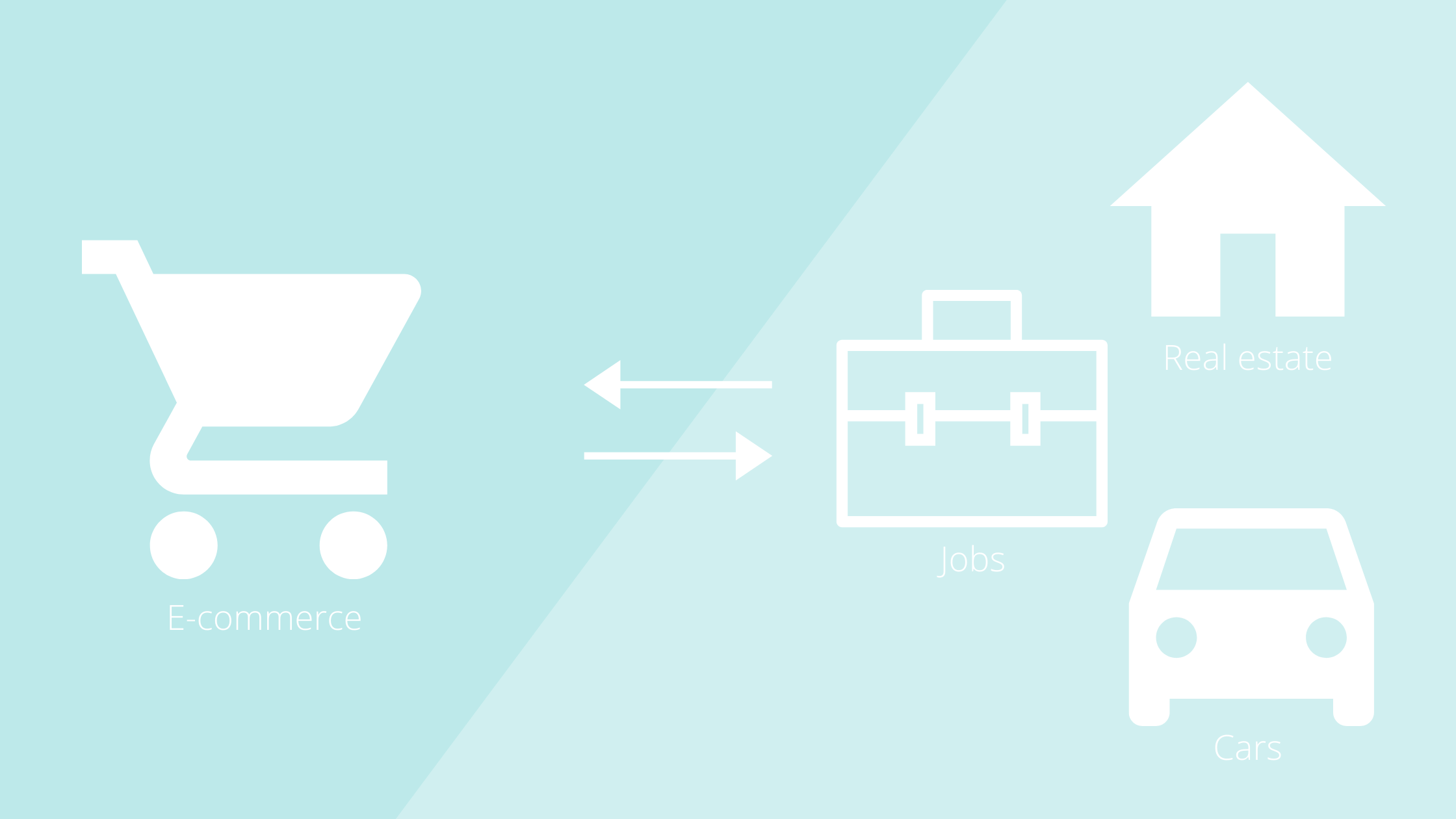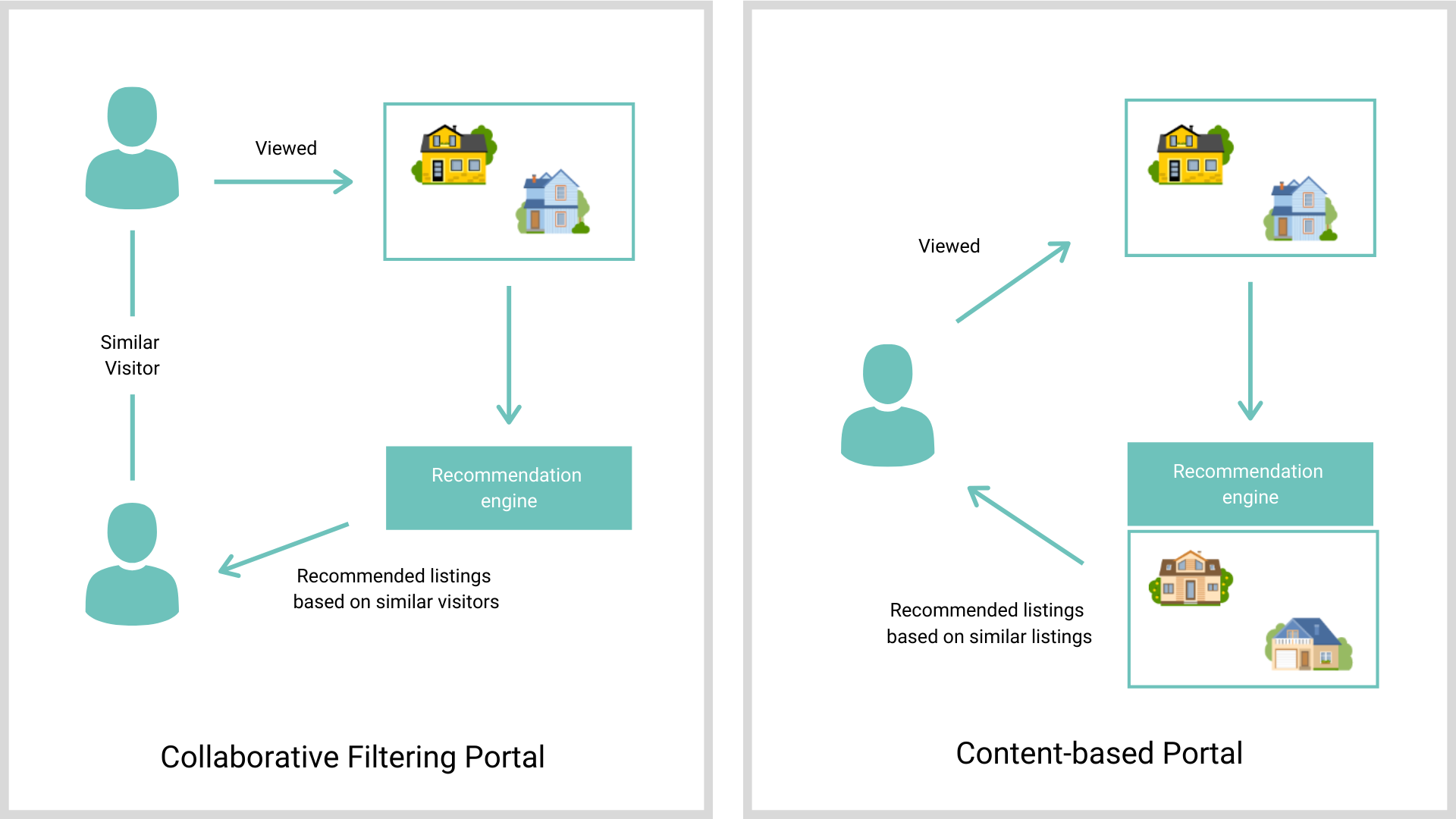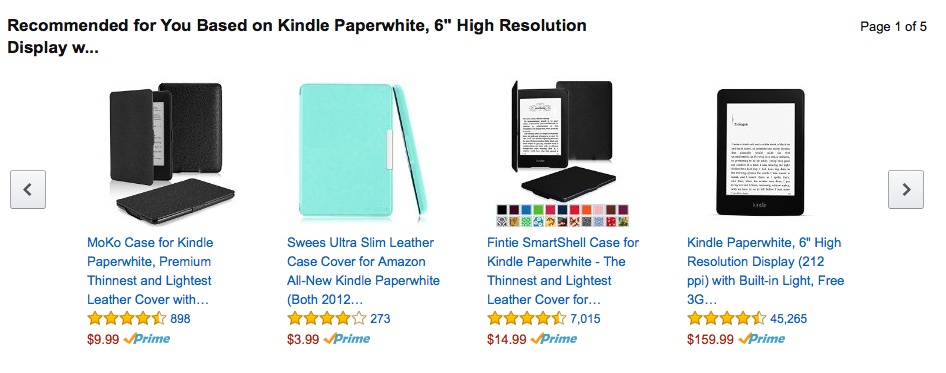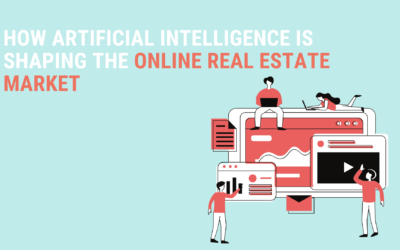Is an e-commerce recommendation engine suitable for real estate, car & job portals?
5 May 2020 | 8 min read

Recommendation engines enable customers to see data that is relevant for his or her taste, style, and preferences and ensures he or she spends minimum time searching for the right information and maximizing the conversion rates.
As we move into an era of big data, it is becoming more and more important to find ways to scan through the huge amount of data. Recommendation systems in AI are extremely good at doing this.
Next, we will explain more about recommendation engines and why an e-commerce recommender system is not suitable for real estate, car and job portals., style and preferences and ensures he or she spends minimum time searching for the right information and maximizing the conversion rates.
You will read about the next topics in this blog:
- What is a recommendation system or engine in AI?
- What are the benefits of a recommendation engine?
- Types of recommendation engines.
- How does an e-commerce recommendation system work?
- How does a real estate, car, and job portal recommendation system work?
- So why doesn’t an e-commerce recommendation engine work on a real estate, car, and job portal?
- Examples of recommendation engines in real life.
- What do you need to build a good recommendation engine?
- General challenges.
What is a recommendation system or engine in AI?
A recommendation engine is a system that suggests information, products, services to visitors based on different data sources.
The recommendation can come from a variety of factors such as past user behavior, similar users, similar products, and more.
In a world with tons of information and product overload, a recommendation engine provides an efficient way to serve users with personalized information and solutions.
These systems are quickly becoming the best way for users to get exposed to the whole digital world through the lens of their experiences, behaviors, preferences, and interests.
What are the benefits of a recommendation engine?
A recommendation engine has a lot of benefits: it can significantly boost revenues, conversions, click-through rates (CTRs), and more. Usually, it has a positive effect on the user experience, thus translating to higher customer satisfaction and retention. Within an e-commerce business, you also have important benefits like cross-selling and upselling.
One of the companies that use a recommendation engine is Netflix. It has thousands of movies. But instead of having to browse through all those items, Netflix presents you with a much narrower selection of items that you are likely to enjoy. But they really take it to the next level by showing you personalized covers for each movie.
This possibility saves the customer time and gives them higher customer satisfaction. With this function alone, Netflix received lower cancellation rates. This saved the company around a billion dollars a year.
Recommender systems have been used for almost 20 years by companies like Amazon or Netflix. Industries such as finance, travel, and real estate only started to use this during the last few years.
“ Recommendations Engines — one of the concepts in Artificial Intelligence is fast gaining momentum. It is a perfect marketer tool especially for e-commerce / online businesses and is very useful to increase turn around (sales, profits etc.) ”
Types of recommendation engines
There are loads of types of recommendations. We will discuss the 2 most popular one’s: a content-based recommender and collaborative filtering
Content-based recommender
Content-based recommender uses data collected from each listing or item itself and from the users. For a house for example, these could be the price, address, amount of bedrooms and year it was built. The list of features for each house is used to create its specific profile.
User profiles are generated by tracking their behavior on the website or their user history.
These 2 combined can be leveraged in a content-based filtering engine. The AI system measures the similarity between a user’s profile and certain content or listings. It uses that information to generate recommendations.
Collaborative filtering
Collaborative filtering is another used technique that is pretty common. This is more complex and casts a much wider net, collecting information such as behavior from other users to create suggestions for you.
For example, when you look at certain apartments on a real estate portal, the engine will build a profile based on your user behavior. Collaborative filtering would suggest other listings that are also viewed by users with a similar profile like yours.
Usually, collaborative filtering has a higher accuracy than content filtering. However they can also have some increased variability and less interpretable results.

How does an e-commerce recommendation system work?
An e-commerce recommendation engine is an engine installed on an e-commerce site such as Amazon. It is built and optimized specifically for websites that have a lot of static products and returning visitors.
An e-commerce recommendation engine is based on 2 things:
Products
A large number of products that stay more or less the same on the website for a long time, some are added to the website and some are removed. But not in the quantities and in a timeframe like on a real estate, car, or job portal. And most of them have well-defined properties.
Customers/visitors
Visitors of the website usually have more purchases and interactions, especially in the long run. For example, a lot of people have been customers of Amazon for years. The decision-making process for buying a phone, book, … is also a lot shorter in comparison to buying a house or car. This means that in a shorter period of time there are more interactions that lead to the purchase of a product. With a webshop, a lot of people already have an account with certain demographics such as age and gender.
The outcome is:
- Similar products are shown based on the products you viewed/bought before.
- Similar products are shown based on the similarity of other people’s profiles and your profile.

How does a real estate, car & job portal recommendation system work?
A portal recommendation engine is an engine installed on a real estate, car, or job portal. It is built and optimized specifically for websites that have a lot of dynamic listings and tons of new users with fewer interactions compared to e-commerce websites.
A portal recommendation engine is based on 2 things:
Listings
Almost all listings (houses, cars, and jobs) are dynamic on the website. Which means they usually stay on there for a short period of time. According to Zillow, the average time it takes to sell a house is 65 to 93 days. A lot of interesting properties are “hidden” in the descriptions.
Users
Visitors of a portal normally only have 1 ‘purchase’. You (usually) only buy one house, one car, or take one job on a longer timeframe. After the initial purchase, it’s pretty useless to show similar listings. The decision-making process for buying a house or car is longer in comparison to buying a phone or book on Amazon. This means that there could be a lot of interactions, not necessarily leading to the purchase of a product. Most of the time, especially with real estate and car portals, people are not logged in meaning there is no background information of the user. The data that is used from users are scrolls, viewed images, clicks, time on a page, and more.
The outcome is:
- Similar listings are shown based on the previous listings that have been looked at.
- Similar listings are shown based on the similarity of other people’s profiles and your profile. These are listings that the visitors would have not considered otherwise.

So why doesn’t an e-commerce recommendation engine work on a real estate, car, and job portal?
Cold start: there is a cold start problem when a user visits the portal for the first time. Firstly, there is no way you can recommend items to the new user because you don’t know his/her interests and background information.
Dynamic listings: the recommendation engine needs to adapt, constantly, because the listings on the portal change all the time. As already said according to Zillow, the average time it takes to sell a house is 65 to 93 days.
Non-returning visitors: visitors (usually) only need to do one ‘purchase’ on a real estate, car, or job portal. After that, they will not return, at least not for a very long time to do the next ‘purchase’. This makes it more difficult to create clusters/profiles because the people in those profiles are constantly changing.
Hidden information: a lot of useful properties are hidden in the description and images.
E-commerce recommendation engines are trained on a different level. They are used to more data such as logged-in users, static products, and returning visitors. This is why an e-commerce recommendation engine will underperform on a real estate, car, or job portal.
Examples of recommendation engines in real life
Some examples of recommendation engine usage are seen in the following:
- Facebook — “People You May Know”
- Netflix — “Other Movies You May Enjoy”
- Amazon — “Customer who bought this item also bought …”
- Google — “Visually Similar Images”
- YouTube — “Recommended Videos”
- LinkedIn — “Jobs You May Be Interested In”
- Waze — “Best Route”
- Spotify – “Best Music”

What do you need to build a good recommendation engine?
A recommendation system can be powerful but is not ideal for every business situation. Before you can even begin to think about building a recommendation engine there are several criteria that your business needs to have:
- You will need the a lot of data. It will depend on the type of recommendation engine you will build but an absolute minimum is a good-quality database on the items. If you want personalized recommendations, you will also need a good amount of data on the users and their interactions.
- You will need the knowledge and resources. There is a vast amount of algorithms to be used in recommendation engines, having the skills in house to select the appropriate algorithm and to be able to get it working is an absolute minimum. Furthermore, the times will changes and user-preferences will changes, so you’ll need the skills to keep your recommendations up to date.
General challenges when building a recommendation engine
As mentioned above, we will need the data, but it doesn’t mean when it’s present it is directly usable. Data sets that contain a lot of rows that contain zero or blank values can really be a problem to build good recommendation systems. It’s critical to solve these data quality issues at the source. A known saying is ‘Garbage in, garbage out’. So identify the data quality problems and address them where you can. In a later stage the tech team might solve some issues but it’ll be time consuming and your recommendations will become less accurate.
Having an imperfect labeling or having similar products with different labeling can be ignored or incorrectly consumed. This means that the information does not get incorporated correctly.
Data sets are becoming bigger and bigger than ever before and can lead to performance reduction. The traditional approach has become overwhelmed by the multiplicity of listings and visitors.
Conclusion
Recommendation Engine is your companion and advisor to help you make the right choices by providing you tailored options and creating a personalized experience.
Currently, it is seen in the online retail and media industries. It is catching up in transportation, finance, and healthcare. One of the most recent uses of recommendation engines is for real estate websites that offer thousands of properties.
It is beyond a doubt that recommendation engines are getting popular and critical in the new age of things. It is going to be in the best interest to learn to use recommendation engines for businesses to be more competitive and consumers to be more efficient.
Unfortunately, e-commerce engines are not suitable for portals and will often have poor results.
Want more information about a recommendation engine specifically built for real estate, car, and job portals? Visit our recommendation page.
References
https://medium.com/humansforai/recommendation-engines-e431b6b6b446
https://www.sciencedirect.com/science/article/pii/S1110866515000341
https://en.wikipedia.org/wiki/Recommender_system
https://www.loop54.com/blog/how-do-product-recommendation-engines-work
https://cdn2.hubspot.net/hubfs/532045/oracle-ds-introduction-to-recommendation-engines.pdf
How House Alerts Help To Obtain Higher Click-Through Rates
Thanks to house alert systems, you can quickly inform potential buyers when new properties that match their criteria show up. Here is a step-by-step guide that will show you how you can retarget potential customers and help them find the house of their dreams.
Two Unique Dashboards That Will Help Your Real Estate Agents Close More Deals
Being successful in sales is about knowing your product inside out and knowing everything there is to know about your customer. Luckily, it’s easier to achieve these two goals today than ever before by using some unique dashboards. Read everything about it here:
How Artificial Intelligence is Shaping the Online Real Estate Market
Now in 2021, the message is clear; AI is here, and it’s here to stay. But what impact does this technology have on the real estate market? Read everything about it in this article



